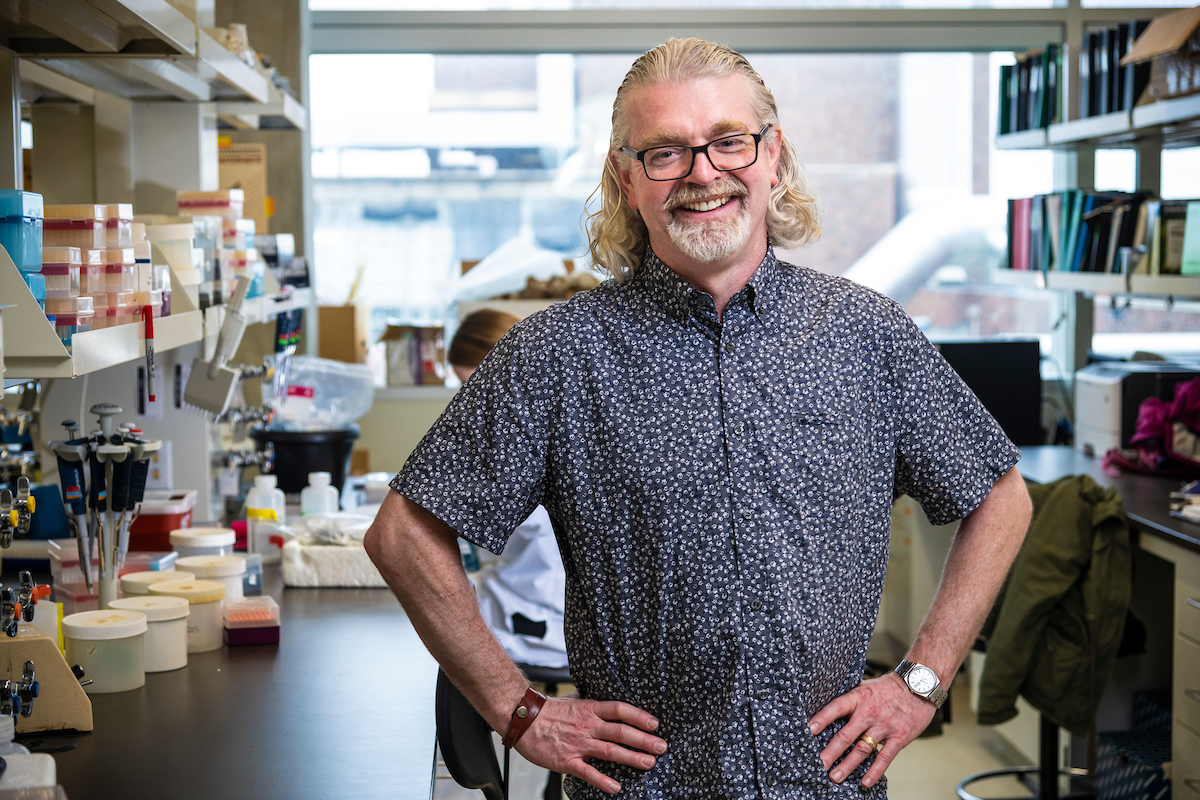
David Coltman, the new Chair of the Department of Biological Sciences, wants to improve the community and would like to better address equity, diversity, inclusion, and ethics within the department and faculty. Photo credit: John Ulan.
"Inspire discovery for a better world," said David Coltman, professor and incoming chair in the Department of Biological Sciences, quoting from the department's strategic vision, of his commitment in his new administrative role.
Assuming the role of department chair for the next five years, Coltman takes over the position from Michael Caldwell. Coltman shared his vision for the department, taking on that classic million dollar question posed in job interviews: Where do you see yourself in five years?
"I think, like every academic unit, we are facing considerable internal pressures and external challenges," replied Coltman. "From hallway conversations and stakeholder feedback, we need to improve our community, and I would also like to see us better address equity, diversity, and inclusion and ethics from the inside out."
"Biology by its very nature is a science that seeks to understand diversity-it's fundamental to what we do," continued Coltman, "I am committed to maintaining our research and teaching diversity to the best of my ability and focusing on diversity writ more largely."
Biological Sciences' professoriate is approximately one-third female, on par with the university's overall representation numbers. "It's not good enough-but I am optimistic. We hire on merit, and our recent hiring has been much closer to gender parity. I believe we will continue to move the needle in the right direction."
A renowned molecular ecologist with a focus on population genetics, Coltman takes a fundamentally interdisciplinary approach to his research as he uses molecular tools and genetic principles to address ecological and evolutionary questions, an approach which stands him in good administrative stead as he works to shepherd the department-along with approximately 100 faculty, 200 support staff, 300 graduate students and postdoctoral fellows, 400 honors and specialization students, plus many more undergraduate student majors and minors-forward into the future.
"I see myself as a bridging person in the way that I approach my discipline," said Coltman, who has co-authored nearly 70 papers with 15 different UAlberta biological sciences collaborators since he joined the department. Often co-supervising many of his graduate students with field ecologists, Coltman maintains an active research program, presently supervising seven grad students and one postdoc.
Coltman completed his undergraduate degree in biology at Queen's University, where he first fell in love with ecology and evolution, later earning his PhD at Dalhousie University in his native Halifax, with a focus on DNA fingerprinting harbor seals to study parentage in a wild population on Sable Island. Following a three-year postdoc at the University of Edinburgh-which he cites as one of the world's best places to study evolutionary genetics and animal breeding-Coltman completed an NSERC postdoc at the University of Alberta, working with Curt Strobeck in what Coltman calls the top molecular ecology lab in Canada at the time. Coltman took on a faculty position at the University of Sheffield in England before eventually returning to Canada four years later to take up a faculty position on campus in 2004, which he has called home ever since.
No stranger to administrative responsibility-he previously served as associate dean (research) in the Faculty of Science from 2014 to 2018 and acting chair in the Department of Biological Sciences in 2013/14-Coltman is committed to not letting his ever-expanding to-do list keep him for too long from doing one of the things he loves most in the world: teaching.
"I want to be in the classroom," said Coltman.
Known for not only his passion for teaching and his strong research credentials, Coltman, who most frequently teaches BIOL 380: Genetic Analysis of Populations, is much beloved for his ironic science t-shirt collection, visible each Friday during the term.
And he is also fiercely committed to further fostering the culture of teaching in the broader department, the University of Alberta's largest, ironic t-shirt or not.
"I look forward to building community for a better department."